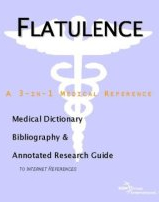Fixes for Flatulence
For education only, consult a healthcare practitioner for any health problems. Disclaimer.

The symptoms of gas can include abdominal discomfort, belching, flatulence, and other symptoms.
The National Digestive Diseases Information Clearinghouse provides a list of gas-causing foods and activities:
- Eating too many carbohydrate-rich foods, high in starches, sugar, and fiber. These include beans, dairy products, soft drinks, and fruit drinks.
- Drinking very quickly.
- Activities that cause your stomach to fill with air, including chewing gum, smoking, and wearing dentures that are too loose.
Dr. Rubman's Digestion Connection: Fixes for Flatulence
Hippocrates has been quoted as having said, "Passing gas is necessary to well-being." What was true in ancient Greece still holds true today. Flatulence -- the passage of intestinal gas -- is a normal function of the human body, something each of us does between 10 and 20 times daily. But that doesn't make it any less awkward when it happens in the wrong place at the wrong time.
According to Daily Health News contributing medical editor Andrew L. Rubman, ND, gas is a natural byproduct that develops when normal, beneficial bacteria in the intestines act to break down undigested food particles. This gas is eventually released through the rectum, and most often it is odorless (or at least mild) and quiet. That's of little comfort, however, to those who suffer from chronic, noxious gas, which is almost inevitably accompanied by chronic social embarrassment.
🚫 Preventing Gas Fumes
The character of gas depends on what you eat and how you eat it, says Dr. Rubman, and it's not all the same. The inoffensive kind of harmless, odorless gas contains hydrogen, carbon dioxide, nitrogen, oxygen and sometimes methane. The more embarrassing variety contains byproducts of digestion, such as sulfur.
Questions to ask yourself if you suffer from the embarrassing kind of intestinal gas:
Are you making unhealthy food choices? Foods that contain carbohydrates (especially sugar, white flour products and white potatoes) are most likely to fuel bacteria and cause fermentation.
Did you eat too much or too fast? These bad habits pose a challenge to the digestive tract, primarily because digestion is incomplete. "The less you chew your food, the greater likelihood of intestinal gas," says Dr. Rubman.
Did you consume too much liquid with your food? Fluids, even water, dilute hydrochloric acid in the stomach making it less likely your food is thoroughly digested.
✅ How to Take a Pass on Gas
Dr. Rubman explains that while over-the-counter remedies like Beano and charcoal pills may temporarily correct the problem, they fail to address the underlying cause of most flatulence -- diet. Here are his safe and natural tips for healthier eating:
🥖 Limit Certain Carbohydrates
Carbohydrates are more apt to cause gas than proteins or fats since they are so often incompletely digested. Among the biggest culprits are foods containing simple sugars like fructose, high-fructose corn syrup, or sorbitol. Dr. Rubman recommends opting for healthful carbs -- whole vegetables and fruits that are easier to digest.
🍽️ Be Careful About Food Combinations
Avoid mixing carbs like French fries with proteins like cheeseburgers. These combinations are difficult to digest and likely to cause gas. Eat fruit as a snack on its own, or 30 minutes before a meal or an hour or two afterward.
🫘 Don't Spill the Beans
Beans contain the sugar raffinose but are packed with vital nutrients. Reduce their flatulent effect by washing them well, soaking overnight in cold water, then cooking thoroughly until they "pop in your mouth like ripe grapes."
💊 Take a Digestive Enzyme
Dr. Rubman believes virtually everyone over 30 can benefit from taking digestive enzymes with meals. He recommends products like DuoZyme by Karuna and Gastri-Gest by Priority One. Also: eat slowly, limit fluids with meals, chew thoroughly (30 chews per bite), and don't overeat.
⚠️ Chronic Flatulence: Not a Laughing Matter
Chronic flatulence can be a sign of irritable bowel syndrome or other serious issues. If you suffer from persistent, noxious flatulence (especially when the odor extends to the breath), schedule a visit with a physician specializing in digestion and GI diseases.
Source: Andrew L. Rubman, ND, director, Southbury Clinic for Traditional Medicines, Southbury, Connecticut.